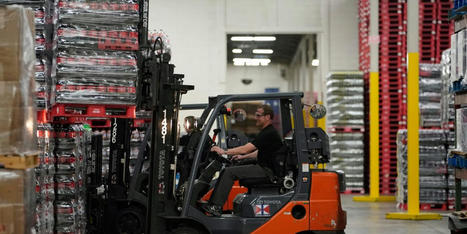 Your new post is loading...
 Your new post is loading...
On January 30, the European Union released the final draft of the Corporate Sustainability Due Diligence Directive. If adopted, the CS3D will be the latest reporting requirement imposed on EU businesses to address environmental, social, and governance standards relating to climate change and human rights both within the company and in the supply chain. The CS3D will most likely be adopted in the spring, going into effect in phases starting in 2027.
Via EcoVadis
After years in the making, Canada’s Modern Slavery Act will soon be in effect. Those within the scope will need to prepare public annual reports on their efforts to eliminate forced or child labor use in their value chains. First reports are due as soon as May 31, 2024.
What is the Canada Bill S-211 and how will it impact your supply chain due diligence and disclosure? The snapshot outlines what is covered, who is in scope, and how to prepare for compliance.
Via EcoVadis
The obligation to comply with supply chain regulations from the EU Supply Chain Act to a draft of US supply chain due diligence laws is spurring firms to rethink sourcing, supply chain, manufacturing policies, and supporting applications. In addition, the US and the EU alone are currently spending $1.4 trillion on environmental sustainability and climate adaptation. There’s also $17.5 billion in VC funding for green tech, and the global market for green financial instruments is $658 billion. These regulatory and investment initiatives provide your firm with opportunities to reassess your supply chain to focus on enhancing sustainability of critical processes such as monitoring supplier labor practices and diversifying supplier geographical risk.
Via EcoVadis
Efforts to tackle modern day slavery are stalling with nearly half the number of companies disclosing anti-slavery measures within their supply chains, according to the international procurement body.
Only 29% of organisations required to produce a modern slavery statement have submitted it to the UK government registry for 2022, an analysis by the Chartered Institute of Procurement and Supply (Cips) found.
It called on ministers to better enforce critical transparency rules that it said were being ignored.
Companies with a turnover of more than £36m a year are required to publish an annual statement outlining the steps they are making to address slavery in supply chains, according to the UK’s Modern Slavery Act 2015.
They are also “strongly encouraged” to submit statements to the Home Office’s modern slavery statement registry, although it is not mandatory.
Via EcoVadis
During the most recent Calgary City Council meeting, new regulations related to single-use plastics were passed. Among the provisions in the new law is a mandatory fee for reusable and paper bags. Four out of the fourteen council members objected to the bill but the measure was passed 10-4 after many hours of discussion and debate. The new bylaws will go into effect in 2024.
As part of the city’s single-use plastics reduction strategy which was released to the public last year, Calgary’s new law regarding the use of single-use plastics is expected to decrease the amount of waste the city produces. The bylaw does not specifically ban plastics since it is covered by federal regulation. The new measure is meant to encourage individuals to bring reusable bags when shopping. According to its data, the city says approximately 3.5 million plastic shopping bags, 6.4 million plastic utensils, 2.4 million takeout containers, and 2.4 million disposable cups are thrown out in residential and commercial waste bins each week.
Via EcoVadis
Local environmental groups criticized Mayor Eric Adams for a new rule that will allow New York City landlords to skirt upcoming environmental regulations for buildings by purchasing large quantities of carbon credits.
Last week, the New York City Department of Buildings issued a final version of a long-anticipated carbon credit policy—a key part of the city’s 2019 carbon emissions law for buildings, Local Law 97— that would allow property owners who cannot meet the law’s strict emissions standards through renovations to purchase carbon credits instead. Landlords would be allowed to buy renewable energy credits, or RECs, to offset all pollution generated by a building’s electricity use.
Via EcoVadis
The European Parliament and EU member states reached an agreement late on Thursday (10 November) on a new law regulating the contribution of the forestry and land use sector to the EU’s 2030 climate goals.
The land use, land use change and forestry (LULUCF) sector covers the use of soils, trees, plants, biomass and timber and is responsible for emitting and absorbing CO2 from the atmosphere.
Under the political agreement reached yesterday, the EU will aim to remove 310 million tonnes of net CO2 equivalent from LULUCF sectors by 2030.
“CO2 carbon sinks can help us achieve our climate goals, including carbon neutrality, and thus protecting our planet from the fatal negative consequences of climate change,” said Marian Jurečka, the Czech minister of the environment whose country currently holds the EU’s rotating six-month presidency.
“At the same time, the deal ensures different circumstances in each member state are taken into account when setting further ambition towards the 2030 targets,” Jurečka said in a statement.
Via EcoVadis
The new EU battery regulation is a top priority for all EU institutions. It defines the regulatory framework for the ambitions of the European Commission and member states to establish a full EV batteries value chain in Europe. It is therefore remarkable that – despite all EU institutions committing to find compromises swiftly – it will have taken over two years for the new regulation to be adopted and enter into force.
Complex and ambitious
The drafting of the regulation took longer than anticipated because of the complexity of both the proposal and the EV battery value chain as well as the desire to regulate all steps from cradle to gate – from mining over manufacturing, and use, to the end-of-life management. Furthermore, covering a wide range of dimensions (technical, environmental, economic, and social) has turned out to be highly ambitious.
The other aspect to consider is the conceptual idea behind the new battery regulation. It is seen as a blueprint for future EU product legislation, establishing a digital product passport with all its complexities and covering all steps of the product life cycle. Getting things right from the start is therefore of critical importance for all EU institutions and requires intensive consultation.
Via EcoVadis
The California Air Resources Board (CARB) proposed banning the sale of diesel commercial trucks by 2040. The proposal comes just weeks after the state had to battle with high temperatures that threatened to cause blackouts throughout the state.
California has consistently taken bold steps toward aiding in climate change. However, some of its actions have also come under close scrutiny. Its latest proposal is expected to meet opposition from the trucking industry players and other interested parties.
Via EcoVadis
EU action on tackling deforestation is urgently needed, as rising demand for commodities is exacerbating pressure on land worldwide. To have an impact on deforestation rates, the EU cannot act alone nor focus exclusively on cleaning its own supply chains.
In 2021, the European Commission took the important step of responding to the European Parliament’s call to address EU driven deforestation by adopting a Proposal for a Regulation on deforestation-free supply chains.
Yet if the EU wishes to make a difference in driving global deforestation rates down, it will need to engage with producing countries to address the root causes of deforestation, from forest governance to poverty. Just as importantly, to have meaningful impact on halting deforestation the EU must look beyond the cleaning of its own supply chains and ensure there are accompanying measures in place to maintain positive action in producer countries.
Via EcoVadis
The Securities and Exchange Commission on Monday approved a landmark proposal to require all publicly traded companies to disclose their greenhouse gas emissions and the risks they face from climate change.
Via EcoVadis
“As the first plastic tax to be implemented globally, the UK PPT is a harbinger of the worldwide movement reinforcing the polluter pays principle alongside extended producer responsibility,” said Stephen Jamieson, global head of circular economy solutions at SAP. “By disincentivising the use of unsustainable materials, the government is at the same time incentivising the market value of recyclable plastic, fostering a sustainable circular economy that will have global repercussions.”
Via EcoVadis
The supply chain crisis has prompted many businesses to focus urgently on sustainable sourcing. It’s a good idea, but they should go even further by integrating their overall environment, social and governance (ESG) strategies into their sourcing plans.
Indeed, two-thirds of the average company’s ESG footprint lies with suppliers, according to McKinsey. The cost of failure — even at multiple levels down the supply chain — can be catastrophic to a firm’s reputation. Major incidents have brought widespread attention and spurred enterprises worldwide to double down on sustainable procurement.
At the same time, investor expectations, along with increased regulatory oversight requirements — such as the German Supply Chain Due Diligence Act and the UK Modern Slavery Act — are compelling businesses to establish and execute ESG strategies and uphold high ethical standards.
Via EcoVadis
|
Big changes are coming to corporate sustainability reporting in the European Union and soon in the rest of the world. Starting in fiscal year 2024, the first wave of in-scope companies will be required to disclose ESG impacts under the EU’s Corporate Sustainability Reporting Directive (CSRD). The CSRD overhauls the 2014 Non-Financial Reporting Directive — the EU’s current sustainability framework — and aims to improve the quality of data for investors while helping the EU meet its policy goals under the European Green Deal.
Via EcoVadis
In recent years, environmental, social and governance (ESG) reporting for companies has moved from a "nice-to-have" to an integral part of corporate strategy. An increasing awareness of the need to address the material environmental and social risks and opportunities against a backdrop of strong governance is driving increased reporting. Meanwhile, stakeholder pressure to measure and manage ESG performance is mounting, further supported by regulatory tailwinds.
Increased regulations around the world is requiring companies to disclose information regarding the extra-financial aspects of their business to interested stakeholders. Thus, being proactive in monitoring current and emerging ESG regulations to ensure compliance and remain competitive has become a business imperative.
Via EcoVadis
A law passed by the European Parliament requires companies working in cattle, cocoa, coffee, palm oil, rubber, soy and wood to demonstrate their products aren’t sourced to deforested land or land with forest degradation, or else risk heavy fines.
Companies will have to submit “due diligence” reports showing they took proper steps to verify the origins of their products while also complying with countries’ local regulations on human rights and impacts on Indigenous people.
Critics say the legislation may still lack the teeth to prevent deforestation, especially if political pressure from traders forces EU countries to overlook their noncompliance with the new regulations.
Via EcoVadis
The European Parliament is in support of a new law that would ban exports of plastic waste to non-OECD countries, and phase out the export of plastic waste to OECD countries within 4 years. The Organisation for Economic Co-operation and Development (OECD) is an international organization that works to build better policies and shape policies that foster prosperity, equality, opportunity, and well-being for all.
The EU anticipates positive changes in circularity, resource efficiency, and zero pollution goals as a result of this new law.
The proposal argues for the prohibition of shipments within the EU of all wastes destined for disposal, except if authorized in what it describes as “limited and well-justified cases”.
Via EcoVadis
In the new year, German companies will be forced to monitor their supply chains more strictly.
On January 1, the new Supply Chain Act comes into force, a piece of legislation that dates back to Angela Merkel's time as chancellor. As a result, companies with more than 3,000 employees will be required to comply with certain obligations for their entire supply chain.
According to the Development Ministry, about 900 German companies will be affected. From 2024, the law will also apply to companies with more than 1,000 employees.
Among other things, the companies concerned must carry out a risk analysis, introduce risk management and a complaints mechanism, and report on these measures publicly. In the event of violations within the business or by direct suppliers, companies must take appropriate action.
Via EcoVadis
As EU member states close in on a common negotiating position on the Corporate Sustainability Due Diligence Directive (CSDDD), they are fighting over whether companies should do due diligence for their entire value chain or just the supply chain.
The directive initially proposed by the Commission on 23 February 2022 would require member states to introduce legislation making companies responsible for violations of human rights and environmental standards along its entire value chain.
This would mean that a company would have to conduct due diligence on its suppliers and clients, and it could also be held liable for how its product is used and disposed of.
Via EcoVadis
A couple of weeks before her short stint as prime minister ended, Liz Truss delivered on a pledge to tackle what some – including Truss – saw as red tape holding back “thousands of growing businesses” in the UK. The move focused on exempting small businesses from certain regulations to help stimulate growth. It involved expanding the government’s definition of “small business” to release “thousands of UK businesses” from reporting requirements and regulations.
Small businesses are an undoubtedly important part of the economy. The latest UK government figures (based on previous definitions) indicate that small and medium-sized enterprises (SMEs) account for 99.9% of businesses, contributing 61% of total employment in the private sector.
Many critics of regulation believe rules hold businesses back. Indeed, following Brexit, former government minister Jacob Rees-Mogg identified in excess of 2,400 EU laws for swift removal as part of a bid to stimulate UK economic growth. Our research reviewed a range of evidence on this issue. It confirms that regulations can be burdensome for small business, but the relationship is not that simple. In fact, some “red tape” can even be good for such firms.
Perception surveys often ask owner-managers about regulatory burdens. When asked whether regulations are hindering growth, a reasonable proportion of owner-managers will typically respond that they are, according to our research. The exact figures vary from survey to survey, and regulation is never reported as the most significant issue, but we find that it does regularly feature on the list of obstacles for such firms.
Via EcoVadis
California has enacted an ambitious package of legislation to aggressively combat the climate crisis — a bold move by the world’s fifth-largest economy that could inspire action in other states.
Three years into a drought that is exacerbating wildfires and forcing limits on water consumption, California Democratic Gov. Gavin Newsom recently signed bills that will slash the state’s carbon emissions, protect vulnerable communities by banning new oil extraction close by and create a two-decade pathway to a 100% clean energy electrical grid.
In addition to the new laws, California legislators approved $54 billion in climate spending over the next five years, including investments in electric vehicles, drought resilience and public transportation using the state’s budget surplus.
Via EcoVadis
Final negotiations have begun between the European Council, Parliament and Commission on a regulation that will ban products from the EU market that result from deforestation.
It will impact what is placed on supermarket shelves, and, importantly, retailers might be held accountable.
The proposal focuses on coffee, cacao, cattle, palm oil, soy and wood products. Among these commodities, the palm oil sector is at the forefront of sustainability, reaching 93% uptake of certified sustainable palm oil in Europe, even before legislation.
The core of the proposal requires that only products that are both legally produced and demonstrably free from deforestation should be allowed on the EU market.
To guarantee this, companies must submit a due diligence statement which states that the product is not only deforestation-free but also shows the exact plot of land where it originated.
This can be achieved by making the first importer (operator) responsible for this due diligence statement.
All subsequent actors who handle the product commercially (traders), such as retailers, would then ensure that the information they receive from the operator is correct.
Via EcoVadis
With the public consultation phase now closed, the forthcoming EU policy framework on bio-based, biodegradable and compostable plastics is nearing completion and is expected to be adopted in the second quarter of 2022. It is a crucial piece of legislation for the bioplastics industry, and European Bioplastics (EUBP) welcomes and fully supports the Commission’s initiative to promote bioplastics and to fully recognise their contributions to a sustainable plastics economy and the circular bioeconomy.
Via EcoVadis
“As the first plastic tax to be implemented globally, the UK PPT is a harbinger of the worldwide movement reinforcing the polluter pays principle alongside extended producer responsibility,” said Stephen Jamieson, global head of circular economy solutions at SAP. “By disincentivising the use of unsustainable materials, the government is at the same time incentivising the market value of recyclable plastic, fostering a sustainable circular economy that will have global repercussions.”
Via EcoVadis
From protecting human rights to acting ethically to promoting decent working conditions, companies worldwide are failing to live up to their promises to be socially responsible.
Pressure from shareholders and the public just isn’t enough to force companies to uphold their pledges to protect human rights, according to a World Benchmarking Alliance study of 1,000 companies across more than 60 countries. Only 10 of those companies have achieved the fundamental expectations of the United Nations’ Sustainable Development Goals, according to the WBA. That’s a failure rate of 99% for these powerful companies, which the WBA estimates generate about 25% of the world’s gross domestic product and employ more than 56.5 million people.
Via EcoVadis
|



 Your new post is loading...
Your new post is loading...

